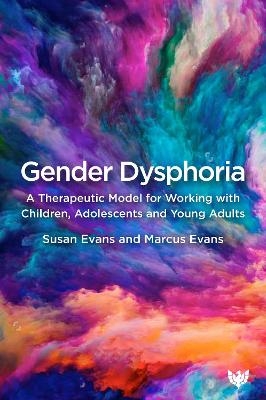
Gender Dysphoria
Phoenix Publishing House (Verlag)
978-1-912691-78-4 (ISBN)
Contains a foreword from Stephen B. Levine and a preface from David Bell.
In recent years, there has been an explosion in the number of children and young people who diagnose themselves as gender dysphoric, or trans. In the UK, and worldwide, there is a growing tendency to refer them on to ‘specialist’ gender services almost as soon as they express any confusion or distress about their biological sex or gender identity. Due to the rapidly rising numbers and various pressures on the system, patients are increasingly likely to be offered life-altering medication and/or surgical treatments, often with little exploration of their emotional world.
As so little is yet known or understood regarding this increase in gender incongruent patients, it seems precipitous to proceed onto physical treatments before any assessment work is undertaken. Many who present as gender dysphoric have complex needs with comorbid problems such as autism, histories of abuse or trauma, social phobias, depression, eating disorders, and other mental health symptoms. Therefore, all aspects of the individual’s life deserve thorough assessment and therapeutic work.
This book is aimed primarily at clinicians working in the field to provide a model for understanding, assessing, and treating gender dysphoria. The model uses a psychoanalytic framework to help explain disturbed states of mind and how psychic defences can be enlisted unconsciously to avoid overwhelming psychic pain. This offers professionals a way of trying to think with, and offer understanding to, their trans identifying clients. Clinical examples are given to illustrate these processes and promote the understanding of transgender children, adolescents, and young people and their internal worlds, their thinking, and their interpersonal relationships. As well as clinical exploration and understanding, the book includes an overview of the current political, social, and clinical environments which have all impacted on the clinical care of trans identifying individuals.
As well as professional and trainee clinicians, this book might also prove useful to parents, other professionals, and possibly the gender dysphoric person too.
Susan Evans is a psychoanalytic psychotherapist trained at the former Lincoln Centre for Psychotherapy. Retired after nearly 40 years in the NHS, she now has a private practice in South East London. She is a member of the British Psychotherapy Foundation, the London Psychoanalytic Psychotherapy Service, and is registered with the British Psychoanalytic Council (BCP). She trained as a State Registered Nurse in 1977, then trained as an RMN and worked within many mental health specialist services including addictions, eating disorders, and in a specialist mother and baby service, which won the Sir Graham Day Award for NHS service development (1999). As a psychotherapist she worked for 12 years at the Tavistock and Portman NHSFT in the Adult Department and also in the Gender Identity Development Service for Children. She was responsible as Course Organiser for the development and delivery as senior clinical lecturer of several training programmes at the Tavistock and a Senior Fellow at University of East London. Marcus Evans is a psychoanalyst and was an adult psychotherapist at the Tavistock & Portman NHS Foundation Trust with 40 years’ experience in mental health, originally training as a psychiatric nurse. After qualifying as a psychotherapist at the Tavistock & Portman NHS Trust, he took up a post as head of the nursing discipline. Marcus was Associate Clinical Director of the Adult & Adolescent departments between 2011 and 2015. Marcus has designed, developed, and taught outreach courses for front line staff in various settings for the last 25 years. He was also one of the founding members of the Fitzjohn’s Service for the treatment of patients with severe and enduring mental health conditions and/or personality disorder in the adult department. He has written and taught extensively and is author of Making Room for Madness in Mental Health: The Psychoanalytic Understanding of Psychotic Communications, published by Karnac in the Tavistock Clinic series.
Acknowledgements
Preface by David Bell
Foreword by Stephen B. Levine
CHAPTER ONE
Why have we written this book?
CHAPTER TWO
Developmental theory
CHAPTER THREE
Psychoanalytic ideas regarding gender dysphoria
CHAPTER FOUR
Working with fixed states of mind
CHAPTER FIVE
The family
CHAPTER SIX
Adolescence
CHAPTER SEVEN
Complexities of delivering therapy
CHAPTER EIGHT
Detransitioners
CHAPTER NINE
The link between suicidal ideation and gender
dysphoria
CHAPTER TEN
The link between emotionally unstable personality disorder and gender dysphoria in mental health settings
CHAPTER ELEVEN
Co-morbid mental health issues and gender dysphoria
CHAPTER TWELVE
The societal, cultural and political environment
References
Index
| Erscheinungsdatum | 10.05.2021 |
|---|---|
| Sprache | englisch |
| Maße | 152 x 229 mm |
| Gewicht | 468 g |
| Themenwelt | Geisteswissenschaften ► Psychologie ► Entwicklungspsychologie |
| Sozialwissenschaften ► Soziologie ► Gender Studies | |
| ISBN-10 | 1-912691-78-7 / 1912691787 |
| ISBN-13 | 978-1-912691-78-4 / 9781912691784 |
| Zustand | Neuware |
| Informationen gemäß Produktsicherheitsverordnung (GPSR) | |
| Haben Sie eine Frage zum Produkt? |
aus dem Bereich


